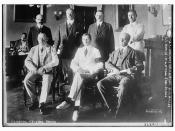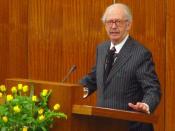Affirmative Action Some of Americas most historic Amendments and court cases have lead to the development of affirmative action. The thirteenth, fourteenth, and fifteenth amendments which gave African American's they're freedom, guarantee's to equal protection and access to vote. The 1896 Supreme Court decision in the case of Plessy v. Ferguson which upheld a "separate but equal" doctrine. In 1941, President Roosevelt signed Executive order 8802 which outlawed segregationist hiring policies. Lyndon Johnson was the first to use the term "affirmative action" in his 1965 Executive order 11246 which requires federal contractors to " take affirmative action to ensure that applicants are employed, and that employees are treated during employment, without regard to their race, creed, color, or national origin". Later in 1967, Johnson expanded the Executive Order to include affirmative action requirements to benefit women. The end result is what we define affirmative action as today: the set of public policies and initiatives designed to help eliminate past and present discrimination based on race, color, religion, sex, or national origin.
Walter E. Williams, writer of the essay "Affirmative action can't be mended" develops the thesis that "affirmative action , in the forum of racial preference , has worn out its political welcome". Williams, in his argument, states that more than 70 percent of respondents to a Gallup poll which asked "should we make every effort to improve the position of blacks and other minorities even if it means giving them preferential treatment" opposed preferential treatment. Even among blacks themselves 66 percents still opposed preferential treatment and only 32 percent supported it. A zero-sum game is defined as any transaction where on person's gain necessarily results in another persons loss. Williams argues that affirmative action programs at The University of California, Berkeley captures the essence of a zero-sum game. Apparently blacks are admitted with considerably lower average SAT scores (952) than the typical white (1232) and Asian student (1254). Williams includes a number of strong premises that support his thesis. In the fourteenth paragraph he states " there is no question that preferential admissions is unjust to both white and Asian students who mat be qualified but are turned away to make room for less-qualified students in the "right" ethnic group. Most of Williams information comes from the university of California, Berkeley as well as UCLA. Williams also presents the fact that 70 percent of the 317 black students who were admitted into UC Berkeley because of affirmative action failed to graduate. Thus leading to another premise stated in paragraph 16. Williams says the fact that a special privilege cannot be created for one person without creating a special disadvantage for another. In the closing sentences of his essay William points out, what I feel is his argument in a nutshell, that even if affirmative action was not a violation of justice and fair play, was not a zero-sum game, was not racially polarizing, it is a poor cover-up for the real work that needs to be done.
Nathan Glazer, writer of "In Defense of Preference" supports affirmative action. Glazer develops the thesis that "racial proportional representation would be a disaster. But basically the answer is yes-the principle of equal participation can and should be given some role. This decision has costs. But he alternative is too grim to contemplate." Glazer supports his thesis with many premises. Glazer believes that affirmative action is owed to blacks because of slavery. The presence of blacks college classes immediately introduces another tone. Glazer is his essay spends a lot of time focusing on the influence of blacks in college as well as there admittance. Glazer states that excluding blacks from universities tramples the idea of democracy. His views are that powerful people support affirmative action so why shouldn't we?. Glazer in his essay pushes the point that today the U.S. is two nations, a white nation and a black nation. Affirmative action, in glazer's eyes join would join the two nations together.
Personally, as a minority, I would never want to be admitted into any college or given a high paying job because of my ethnic nationality. I honestly believe that accepting minorities into a college on a lower curve degrades blacks and other minorities. Its basically telling me and my people that we aren't "smart" enough to do get into a prestige's institution on our own. Williams essay, I felt was the stronger of the two. Although he used an abundant amount of fallacies. In the first paragraph alone when he talks about the percentage of blacks in college. The information is good for what it's worth, but he fails to look at other colleges and other minority groups. Glazer is also charged with the fallacy of questionable use of statistics as well as suppressed evidence. Glazer never once mentions any other minority group other than blacks. Affirmative action isn't only for minorities. There affirmative action laws protect women. Yet either of the essay's even came close to the subject of women. As a Hispanic I would have liked to see where the SAT curve was placed for Hispanics. From the two essay I would have to say I oppose affirmative action. I agree with Williams when he's claims affirmative action is a zero-sum game. Never would I want to tell a white person I received a letter of admission to a college I was less qualified for than him, yet he didn't get

![[Portrait of Imogene Coca, Mary Lou Williams, and Ann Hathaway, between 1938 and 1948] (LOC)](https://s.writework.com/uploads/9/91750/portrait-imogene-coca-mary-lou-williams-and-ann-hathaway-be-thumb.jpg)
![[New York City Mayor William J.] Gaynor reviewing parade (LOC)](https://s.writework.com/uploads/3/32760/new-york-city-mayor-william-j-gaynor-reviewing-parade-loc-thumb.jpg)
![Williams [and] Young Britt (LOC)](https://s.writework.com/uploads/3/32760/williams-and-young-britt-loc-thumb.jpg)

